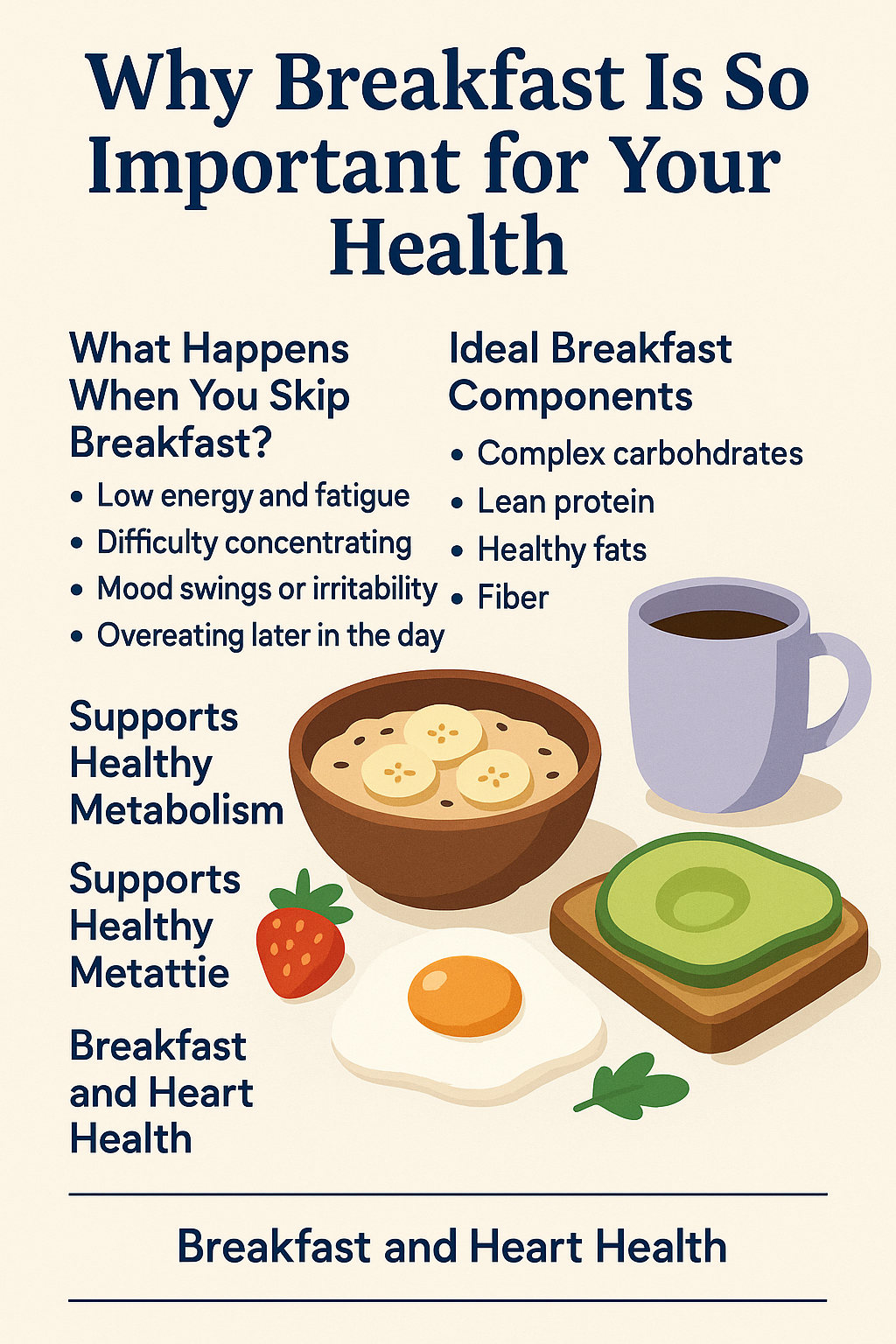Breakfast has often been called “the most important meal of the day,” and for good reason. After a night of fasting, your body and brain need fuel to kick-start the day. Skipping breakfast can affect your energy levels, concentration, and even long-term health. Despite its importance, many people still rush out the door without eating or rely on sugary snacks to get by.
In this article, we’ll explore the real benefits of a healthy breakfast and how it supports both your physical and mental well-being.
What Happens When You Skip Breakfast?
When you skip breakfast, you’re essentially running on empty. Your body has used up its glucose stores overnight and needs replenishment. Without it, you may experience:
- Low energy and fatigue
- Difficulty concentrating
- Mood swings or irritability
- Overeating later in the day
Skipping breakfast may also contribute to higher levels of stress and poor blood sugar regulation.
The Role of Breakfast in Energy and Brain Function
Breakfast provides your body with the glucose it needs for energy and cognitive function. Glucose is your brain’s primary fuel source. Eating in the morning helps you:
- Focus better at work or school
- Maintain steady energy throughout the day
- Avoid mid-morning crashes or sugar cravings
- Improve memory and problem-solving skills
A well-balanced breakfast can improve your productivity and mental clarity.
Supports Healthy Metabolism
Eating breakfast jumpstarts your metabolism and helps your body burn calories more efficiently. When you eat early in the day, your body is better able to regulate insulin and blood sugar, which plays a key role in preventing type 2 diabetes and managing weight.
Skipping breakfast can slow your metabolism and may lead to poor food choices later in the day.
Helps Control Appetite
Eating a nutritious breakfast can help regulate your hunger hormones, reducing the urge to snack excessively or overeat at lunch and dinner.
Protein-rich breakfast foods, in particular, are known to:
- Keep you full longer
- Reduce cravings for high-calorie or sugary snacks
- Support muscle health and metabolism
Great options include eggs, Greek yogurt, tofu scramble, or whole grain toast with nut butter.
Breakfast and Heart Health
Studies have linked regular breakfast consumption with better heart health. People who skip breakfast are more likely to have:
- Higher cholesterol levels
- Increased blood pressure
- Greater risk of obesity and cardiovascular issues
A fiber-rich breakfast, such as oats with fruits or whole grain cereals, supports heart health by reducing LDL (bad) cholesterol.
Ideal Breakfast Components
To truly benefit from breakfast, focus on nutrient-dense options that provide sustained energy and nourishment. A balanced breakfast should include:
- Complex carbohydrates – for lasting energy (oats, whole grain bread, fruits)
- Lean protein – to keep you full and support metabolism (eggs, yogurt, legumes)
- Healthy fats – to support brain and hormone health (nuts, seeds, avocado)
- Fiber – to aid digestion and support heart health (chia seeds, berries, flaxseeds)
Example meals:
- Oatmeal topped with bananas and chia seeds
- Whole grain toast with eggs and avocado
- Smoothie with spinach, protein powder, and almond milk
- Greek yogurt with mixed berries and granola
Quick Breakfast Ideas for Busy Mornings
Think you don’t have time for breakfast? Try these fast and healthy options:
- Overnight oats prepared the night before
- Smoothies you can sip on the go
- Hard-boiled eggs with fruit
- Whole grain wraps with peanut butter
- A banana and a handful of almonds
Meal prepping or keeping grab-and-go items handy can help make breakfast a part of your routine, even on the busiest days.
Breakfast for Different Lifestyles
Your breakfast needs may vary depending on your age, activity level, and dietary preferences:
- Athletes: Higher protein and carbs for fuel
- Children: Nutrient-rich foods to support growth and learning
- Vegetarians/Vegans: Plant-based proteins like tofu, legumes, and seeds
- Seniors: Fiber-rich foods for digestion and heart support
Tailoring your breakfast to your needs ensures that it supports your overall health and lifestyle.
Common Breakfast Mistakes to Avoid
While eating breakfast is important, not all breakfasts are created equal. Watch out for:
- Sugary cereals and pastries – spike blood sugar, then crash
- Highly processed foods – often lack fiber and nutrients
- Skipping protein – leads to faster hunger
- Drinking only coffee – can cause energy crashes and irritability
Instead, aim for whole, nutrient-dense foods that will fuel your body and mind.
Conclusion: Start Strong With a Healthy Breakfast
Eating a nutritious breakfast sets a positive tone for the entire day. It fuels your brain, supports metabolism, stabilizes blood sugar, and helps control appetite. Whether you’re looking to improve your energy levels, concentration, or overall health, a balanced breakfast can be a powerful ally.
Make breakfast a non-negotiable part of your routine — your body will thank you for it!
